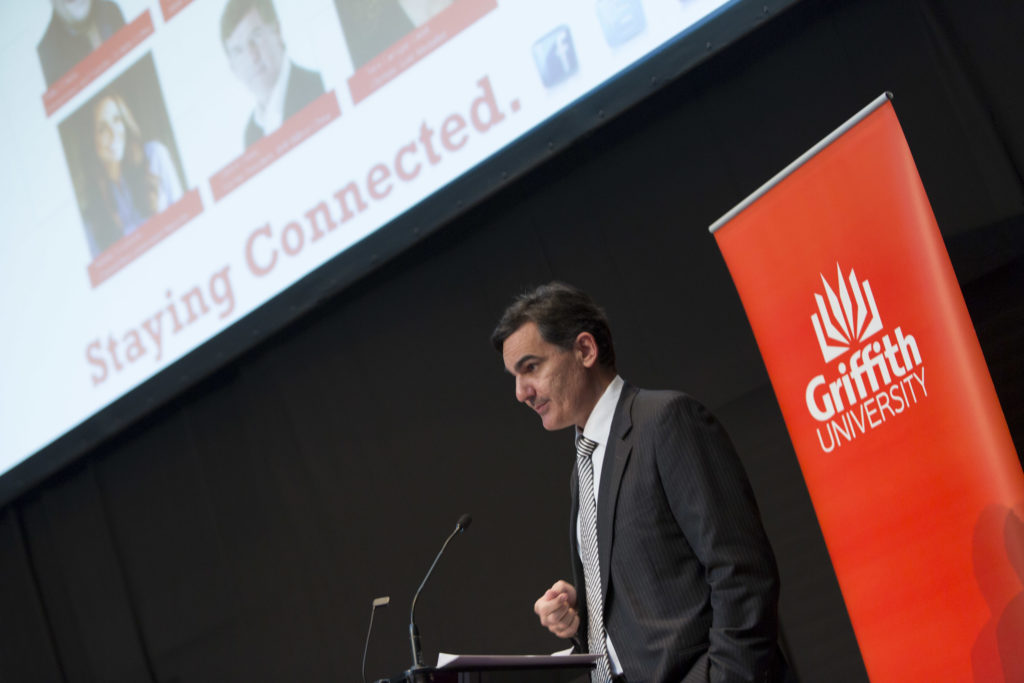This is section 1 of a series on the topic of ‘deriving impact from universities’ in the 21st century, authored by Nicholas Mathiou, Director of Griffith Enterprise.
 “We might have the proudest tradition in the League but we haven’t won a premiership in nineteen years. Tradition, tradition, tradition. We’ve been strangled by it. The days when recruits would flock to the Club from all over the country simply because of its name are long since gone. It’s no good waiting for players to come to you; you’ve got to go out there into the marketplace and fight for them.”
“We might have the proudest tradition in the League but we haven’t won a premiership in nineteen years. Tradition, tradition, tradition. We’ve been strangled by it. The days when recruits would flock to the Club from all over the country simply because of its name are long since gone. It’s no good waiting for players to come to you; you’ve got to go out there into the marketplace and fight for them.”
– David Williamson, The Club, 1978.
Section 1. The university imperative
Introduction
We live in a changed world. We live in a changing world. This space where once we set down roots with some certainty and nurtured dreams and ambitions is no longer the same space. Everything moves differently – faster, more furiously, in directions we once thought not possible. Disruption will not be the new normal, it is that already. Today we lead disrupted lives.
The changes are seismic and all around us. Once familiar industries and organisations have a different look to yesterday, their workforces often unrecognisable from before. Our economies and societies are transforming at an unprecedented pace, both locally and globally. In the midst of this economic and social turbulence are our universities, not isolated, not immune to its effects.
In a world where online access to knowledge and expertise is instant, universities everywhere are facing unprecedented challenges fuelled by rapidly advancing technologies, shifting demographics, trade liberalisation, and now pandemics. As has been the way in recent history, universities continue to compete with each other but now they must also increasingly contend with reduced student numbers, and private organisations and new service providers entering the knowledge and expertise sector. The harsh reality is that many universities are now offering products or services that students can obtain more affordably elsewhere whilst gaining equal or similar benefits.
This confluence of events is placing considerable pressure on universities’ funding models and it is tempting for universities to respond by offering more non-differentiated programs, more resources, more funding or by simply increasing efficiency. However, in our current environment these responses are increasingly unlikely to succeed. The rapid pace of interactions and transactions on a global scale means the potential to be left behind is high. Regardless of how many programs are offered, or how many publications or research grant applications are lodged, or how many networking events universities host and promote, they will not get ahead of the game without taking a hard look at their organisational directions, structures and characters. Whilst most universities excel at what they do, this is no longer sufficient or effective with a traditional business model. Universities worldwide need to reconsider how they approach the business of being a university.
University’s changing role
The importance of universities to economic and social prosperity is enduring and far-reaching. A cursory search engine examination of this topic reveals an abundance of evidence confirming the positive impact of university studies and expert knowledge on the wealth of nations and population wellbeing. There is no doubt that universities have been cornerstones of society. It is therefore almost inconceivable that their place in our world is at risk. However, they are at risk unless they respond to their new global circumstances.
To gain some insight it is important to reflect on how universities have predominantly contributed to society, consider the traditional approaches that have underpinned this contribution, and highlight the changed circumstances and risks they now face. There are two pillars of university functions, namely (i) learning and knowledge; and (ii) research outcomes and innovation, which are both impacted.
Learning and knowledge
Perhaps the most significant and broadly understood contribution of universities has been equipping students with knowledge and skills that benefit them as people and as contributors to society, therefore enhancing society on a wider scale. Universities have also been traditionally recognised for the generation of quality knowledge that can be utilised by all in the community to create wealth and improve living standards.
However, where once the university was that standalone bastion of knowledge, it is no longer the obvious or necessarily preferred source of knowledge. We now live in a hyper-connected world where cumulative knowledge from across the globe is readily accessible. There is a wealth of important information now freely available at our fingertips through high-quality lectures and information sessions on virtually any topic.
We face a dilemma. Society continues to need universities to create high-order knowledge to address its needs and issues, but the call for universities to impart knowledge has been eroded by alternative sources online. If universities are no longer the first port of call to access knowledge, it means considerable pressure is now placed on student enrolments and associated funding models. This in turn reduces the ability of universities to undertake the necessary research to create new knowledge.
Research outcomes and innovations
The second pillar relates to the application of research outcomes beyond academia. It is perhaps the lesser known contribution that universities have made to society, but the evidence surrounds us. The raw materials used to build today’s digital world, computers and the internet, have their origins in university-based innovations. Many of the world’s most important medical breakthroughs and medical devices have grown from first steps in university laboratories. Programs emanating from universities that improve societal wellbeing are equally impressive.
Clearly, throughout the course of history, individual universities have been essential to innovation and improving lives. Today, however, the research function of universities faces intense competition both within and outside the sector. The most effective strategies and solutions to societal problems are not necessarily those brought forward by university researchers. Policy-makers, organisations and potential investors can look elsewhere for innovation and impact.
Crucially, the idea of advancing research outcomes from universities through single discipline and single party domains is virtually redundant. Digital platforms are set up to facilitate collaboration, to find and bring together expertise and resources from every corner of the globe to address problems. Where the scope of university research is focusing, knowledge is expanding exponentially.
In such a challenging environment, there is no doubt universities need to evolve. But how?
Unravelling the complexities
Society needs universities to thrive, but in the current climate many face stalling student enrolments, stagnating funding, and reduced balance sheet capacity. Traditional strategies that held universities in good stead are fast becoming or are already obsolete. In response, some universities may be tempted to discard all traditional strategies. This would be a mistake. Some universities may mount a response by trying everything. This too would be a mistake.
It all raises the difficult question of what is the university’s new role in society if not imparting knowledge. And if this role is to remain paramount, what is the nature or quality of the knowledge universities impart that sets them apart from an array of alternative sources of knowledge in society today?
At the core of every university is immense capability. Universities remain integral to delivering great benefits for society. However, universities cannot be everything to everyone and the universities most likely to succeed are those that take notice of consumer expectations, wants and needs and proactively gear themselves better than their competitors to address them.
But how do universities choose what to do, and how do they get that done?
The aim of this series on how to derive impact from universities is to explore some concepts that help answer these questions. We start, in the next section, by identifying the constants that universities can revert to in this time of great change. We start by determining the university’s ‘North Stars’.
Read the previous article from this series.

ABOUT THE AUTHOR: Nicholas Mathiou is Director of Griffith Enterprise, the innovation and enterprise office of Griffith University. He has extensive commercial experience, having established and grown innovation-based businesses and organisations. He is driven by an ambition to see great social dividends emerge through university-based innovation. He has a deep understanding of the unique challenges involved in advancing innovations within complex organisations and in dynamic environments.
Introduction image credit: photo by Drew Beamer on Unsplash


